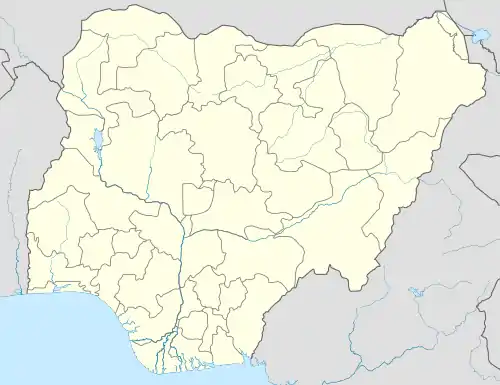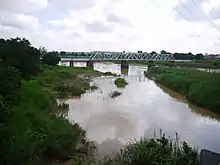Kaduna
Kaduna is the state capital of Kaduna State in north-western Nigeria, on the Kaduna River. It is a trade centre and a major transportation hub for the surrounding agricultural areas, with its rail and road junction. The population of Kaduna was at 760,084 as of the 2006 Nigerian census.
Kaduna | |
|---|---|
%252C_2007.JPG.webp) Kaduna River | |
 Location in Nigeria | |
| Coordinates: 10°31′23″N 7°26′25″E | |
| Country | |
| State | Kaduna State |
| Government | |
| • Governor | Nasir Ahmad el-Rufai |
| Area | |
| • Total | 431 km2 (166 sq mi) |
| Elevation | 250 m (820 ft) |
| Population (2006 census)[1] | |
| • Total | 760,084 |
| • Rank | 8th |
| • Density | 1,800/km2 (4,600/sq mi) |
| • Ethnicities | Gbagyi Adara Hausa Atyap-Bajju Ham Yoruba Fulani Kanuri Marghi Nupe and Igbo |
| Time zone | UTC+1 (CET) |
| • Summer (DST) | UTC+1 (CEST) |
| Climate | Aw |
| Website | www |
Rapid urbanization since 2005 has created an increasingly large population, now estimated to be around 1.3 million. Kaduna's name derives from the Hausa word kada, for crocodile (kaduna being the plural form).[2]
Etymology
The etymology of the word Kaduna is said to be a corruption of the Hausa word for “crocodiles”, Kaddani in the Hausa language.[3] Another version of the name proposes a link to the Gbagyi word/name 'Odna', meaning 'river'.[4]
History
Kaduna was founded by British colonists in 1900.[5] It became the capital of Nigeria's former Northern Region in 1917,[6] and retained this status until 1967. The first British governor of Northern Nigeria, Sir Frederick Lugard, chose the present site for development due to its proximity to the Lagos-Kano Railway.[7]
Climate
| Climate data for Kaduna | |||||||||||||
|---|---|---|---|---|---|---|---|---|---|---|---|---|---|
| Month | Jan | Feb | Mar | Apr | May | Jun | Jul | Aug | Sep | Oct | Nov | Dec | Year |
| Record high °C (°F) | 37.8 (100.0) |
37.8 (100.0) |
38.3 (100.9) |
38.3 (100.9) |
37.8 (100.0) |
34.4 (93.9) |
32.2 (90.0) |
31.7 (89.1) |
32.2 (90.0) |
34.4 (93.9) |
35.6 (96.1) |
35.6 (96.1) |
38.3 (100.9) |
| Average high °C (°F) | 31.7 (89.1) |
33.4 (92.1) |
35.0 (95.0) |
34.2 (93.6) |
31.7 (89.1) |
29.5 (85.1) |
27.5 (81.5) |
27.0 (80.6) |
29.0 (84.2) |
31.1 (88.0) |
32.7 (90.9) |
31.8 (89.2) |
31.2 (88.2) |
| Daily mean °C (°F) | 23.4 (74.1) |
25.0 (77.0) |
27.7 (81.9) |
27.9 (82.2) |
26.3 (79.3) |
24.6 (76.3) |
23.4 (74.1) |
23.2 (73.8) |
24.0 (75.2) |
24.9 (76.8) |
24.2 (75.6) |
23.0 (73.4) |
24.8 (76.6) |
| Average low °C (°F) | 15.1 (59.2) |
16.7 (62.1) |
20.4 (68.7) |
21.6 (70.9) |
20.9 (69.6) |
19.8 (67.6) |
19.4 (66.9) |
19.3 (66.7) |
19.1 (66.4) |
18.7 (65.7) |
15.6 (60.1) |
14.3 (57.7) |
18.4 (65.1) |
| Record low °C (°F) | 9.4 (48.9) |
8.9 (48.0) |
15.0 (59.0) |
14.7 (58.5) |
16.7 (62.1) |
15.6 (60.1) |
16.7 (62.1) |
16.7 (62.1) |
15.6 (60.1) |
13.3 (55.9) |
10.0 (50.0) |
9.4 (48.9) |
8.9 (48.0) |
| Average precipitation mm (inches) | 0.5 (0.02) |
2 (0.1) |
13 (0.5) |
66 (2.6) |
157 (6.2) |
178 (7.0) |
206 (8.1) |
290 (11.4) |
277 (10.9) |
86 (3.4) |
5 (0.2) |
0 (0) |
1,280 (50.4) |
| Average precipitation days (≥ 0.3 mm) | 0 | 0 | 2 | 5 | 13 | 16 | 18 | 22 | 21 | 8 | 0 | 0 | 105 |
| Average relative humidity (%) | 26 | 24 | 37 | 57 | 73 | 82 | 86 | 88 | 85 | 74 | 48 | 31 | 59 |
| Mean monthly sunshine hours | 279.0 | 262.7 | 266.6 | 243.0 | 241.8 | 216.0 | 155.0 | 120.9 | 171.0 | 248.0 | 285.0 | 294.5 | 2,783.5 |
| Mean daily sunshine hours | 9.0 | 9.3 | 8.6 | 8.1 | 7.8 | 7.2 | 5.0 | 3.9 | 5.7 | 8.0 | 9.5 | 9.5 | 7.6 |
| Source: Deutscher Wetterdienst[8] | |||||||||||||
Education
Kaduna is popularly known as the center of learning, as evident from the numerous educational institutions located in the state. Tertiary Institutions in Kaduna city include:
- Kaduna State University
- Nigerian Defence Academy (NDA), Kaduna
- Greenfield University Kaduna
- National Open University of Nigeria, Kaduna Study Center
- Air Force Institute of Technology, Kaduna
- National Teachers Institute (NTI), Kaduna
- School of Midwifery Kaduna
- Kaduna Polytechnic (1968), Kaduna
- National board for Islamic and Arabic studies
- Kaduna Business School
- Dialogue Institute kaduna
- Institute of Ophthalmology, National Eye Centre,Kaduna.
- National board for Arabic and Islamic studies
- National center for nomadic education
Places of worship
Among the places of worship, there are predominantly Muslim mosques.[9] Sultan Bello Mosque is the biggest and a central mosque in kaduna. There are also Christian churches and temples: Church of Nigeria (Anglican Communion), Presbyterian Church of Nigeria (World Communion of Reformed Churches), Nigerian Baptist Convention (Baptist World Alliance), Living Faith Church Worldwide, Redeemed Christian Church of God, Assemblies of God, Roman Catholic Archdiocese of Kaduna (Catholic Church).
Transports
Airport
The city is served by Kaduna International Airport.
Railways
Kaduna is an important junction on Nigeria's Cape gauge railway network. At Kaduna, a branch line connects the Lagos–Nguru Railway to the Port Harcourt–Maidugur Railway.
Kaduna is also on the route of the planned Lagos–Kano Standard Gauge Railway, which has been completed between the national capital of Abuja and Kaduna. Trains for Abuja depart from the Rigasa Railway Station in Kaduna.[10]
Sports
There is a large racecourse named Murtala Mohammed Square, approximately 1.6 kilometres (1 mi) round, inside which is found the Kaduna Polo Club. Kaduna Golf Club is also located within the Kaduna CBD. Other Sports facilities include the Ahmadu Bello Stadium and Ranchers Bees Stadium.
Economy

Kaduna is an industrial centre of Northern Nigeria and the Middle Belt, manufacturing products like textiles, machinery, steel, aluminium, petroleum products and bearings. However, the textile industry has been declining because of factory closings due to neglect during military rule and competition with Chinese imports. Other light manufactures include: plastics, pharmaceuticals, leather goods, furniture, and televisions.[7] Agriculture is also a major industry in Kaduna, and as such, the Bank of Agriculture has its headquarters in the city.[11] Some of the main agricultural exports include: cotton, peanuts, sorghum, and ginger.[12]
Automobile manufacturing also remains an important part of Kaduna's economy.[2] Peugeot Automobiles Nigeria has an assembly plant in Kaduna.[13]
Pottery is highly prized from Kaduna, especially from the Nok culture.
Kaduna Refining and Petrochemical Company (KRPC), one of Nigeria's four main oil refineries is located in Kaduna. It is supplied by a pipeline from the Niger Delta oil fields.[7][14]
A 2009 World Bank survey states that Kaduna is one of the top six cities with the highest unemployment. 20% of the population is estimated to be unemployed.[2]
Kaduna has a large market, recently rebuilt after an extensive fire in the mid-1990s.
Kaduna also has a branch of the Nigerian Stock Exchange.[7]
Kaduna has an inland dry port[15]
Breaking News In Nigeria:Kaduna names Ahmed Bamali new Emir of Zazzau[16]
Notable residents
- Umar Farouk Abdulmutallab, the "underwear bomber" suspect of the terrorist arson attempt on Northwest flight 253 in December 2009, grew up here and returned to the city on holiday.[17]
- Tijani Babangida, footballer who played winger with Ajax
- Celestine Babayaro, footballer who played mainly in the Premier League
- Michael Eneramo, footballer
- Fiona Fullerton, British actress and former Bond girl.
- Zamani Lekwot, statesman
- Ahmed Mohammed Makarfi, politician
- Mohammed Namadi Sambo, politician
- Shehu Sani, politician
- Uba Sani, politician
- Leke James, footballer
- Dahiru Sadi, footballer
- Adam A Zango, Kannywood actor, musician, singer and dancer.
- Talib Zanna (born 1990), basketball player in the Israel Basketball Premier League
See also
References
- Summing the 2 LGAs Kaduna North/South as per Federal Republic of Nigeria Official Gazette (15 May 2007). "Legal Notice on Publication of the Details of the Breakdown of the National and State Provisional Totals 2006 Census" (PDF). Archived from the original (PDF) on 5 March 2012. Retrieved 2007-05-19.
- "Kaduna". The Forum for Cities in Transition. Retrieved 13 November 2016.
- "Kaduna | Location, History, & Facts". Encyclopedia Britannica. Retrieved 2019-07-28.
- Shekwo, Joseph Amali (1979). Fundamentals of the Gbagyi Language. Zaria: Centre for Adult Education and Extension Services, Ahmadu Bello University. OCLC 11043184.
- Toyin Falola, Ann Genova, Matthew M. Heaton, Historical Dictionary of Nigeria, Rowman & Littlefield, USA, 2018, p. 217
- Fletcher, Banister; Dan Cruickshank (1996). "Africa". Sir Banister Fletcher's a History of Architecture. Architectural Press. p. 1466. ISBN 0-7506-2267-9.
- "Kaduna". Encyclopædia Britannica. Retrieved 13 November 2016.
- "Klimatafel von Kaduna / Nigeria" (PDF). Baseline climate means (1961-1990) from stations all over the world (in German). Deutscher Wetterdienst. Retrieved 14 July 2016.
- J. Gordon Melton, Martin Baumann, ‘‘Religions of the World: A Comprehensive Encyclopedia of Beliefs and Practices’’, ABC-CLIO, USA, 2010, p. 2107
- Muhammad, Hamisu (23 July 2016). "A memorable trip on the Abuja-Kaduna train". Daily Trust.
- "Nigeria's Bank of Agriculture - financing farmers". SukFin. Retrieved 2020-05-30.
- "Kaduna". Columbia Electronic Encyclopedia (6th ed.). ISBN 9780787650155. Retrieved 13 November 2016.
- "Peugeot Nigeria | Motion & Emotion". www.peugeotnigeria.com. Retrieved 2019-08-01.
- "Kaduna Refining and Petrochemical Company (KRPC)". www.nnpcgroup.com. Retrieved 2019-08-01.
- "Kaduna Inland Dry Port (KIDP)". Kaduna Inland Dry Port. Retrieved 2019-07-28.
- "Breaking News In Nigeria:Kaduna names Ahmed Bamali new Emir of Zazzau". The African Media. 2020-10-07. Retrieved 2020-10-08.
- Nossiter, Adam (2010-01-17). "Lonely Trek to Radicalism for Terror Suspect". The New York Times.
External links
![]() Media related to Kaduna at Wikimedia Commons
Media related to Kaduna at Wikimedia Commons